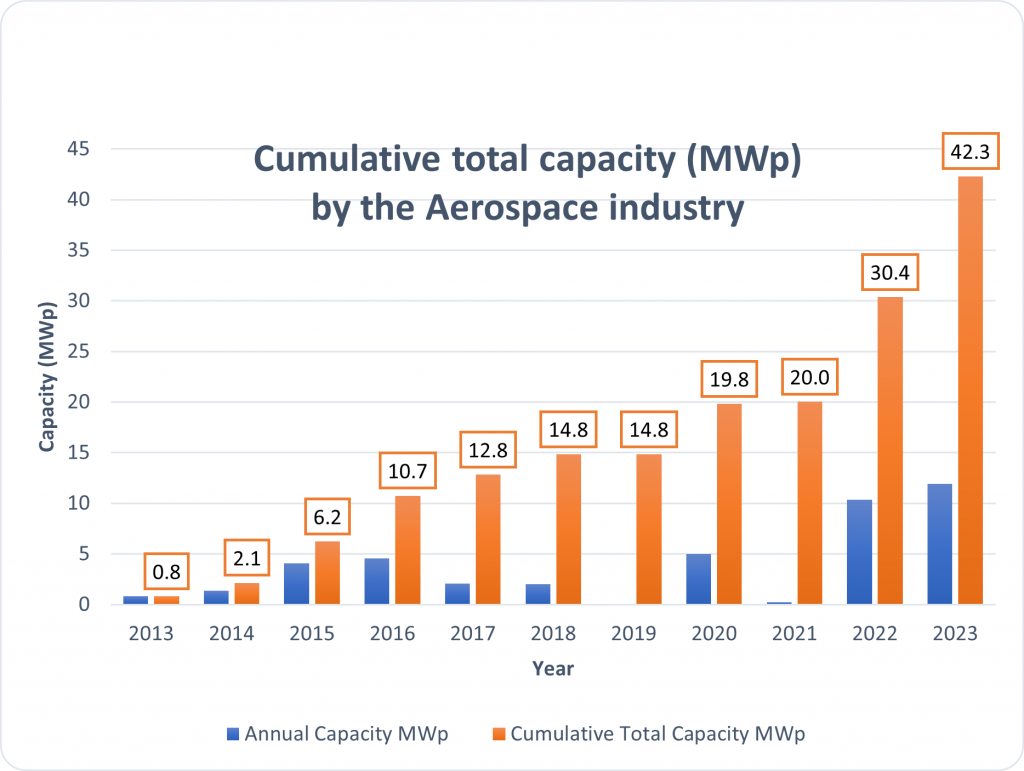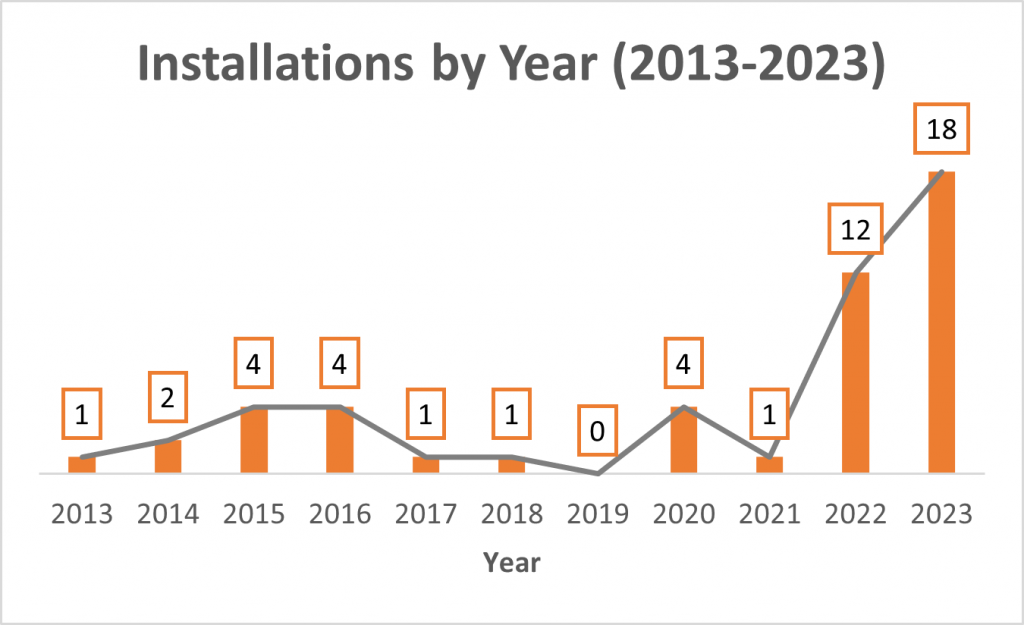Sustainability > Singapore Aerospace Industry Solar Adoption Report 2023 > Key Findings
KEY FINDINGS
-
Total deployed solar capacity by the aerospace industry
(as of end 2023)
42.3 MWp
The total installed capacity in the aerospace industry reached 42.3MWp in 2023, or 214% of the 2020 installed capacity of 19.8MWp. This means more solar capacity was installed in the years 2021 to 2023, as compared to the preceding eight years. This growth can be seen in Figure 1 below. The installed capacity by the aerospace industry represents 4.2% of the total installed capacity in Singapore[1], or 6.6% of the installed capacity in the non-residential private sector.[2] Aerospace companies’ investment in solar has grown in tandem with Singapore’s solarisation efforts, maintaining its more than 4% contribution.
-
Total number of installations
48 (^182%)
The total number of installations was 48 in 2023, a leap from the 17 recorded up to 2020. A total of 31 new installations were made in 2021 to 2023, inclusive of 10 that were installed by JTC under its rooftop licensing scheme. This growth in the number of installations is illustrated in the following figure.
-
Amount of building, hangar and car park roof space used
253,029 sqm
A total of 253,029 sqm has been used for solar deployment by the aerospace industry – equivalent to 35 soccer fields.
-
Improved efficiency of electricity generation
^39%
An interesting observation is that the increase in electricity generated in 2021-2023 was achieved with a smaller deployed area than in preceding years. This is illustrated in the table below which shows that 39% more electricity is being generated per sqm compared to the previous period.
| Period | Deployed Area (sqm) | Electricity Generated (kWh) | Electricity/area kWh/sqm |
| 2013–2020 | 136,837 | 21,858,005 | 160 |
| 2021–2023 | 116,193 | 26,305,639 | 226 |
| Total | 253,029 |
-
Total Energy Produced Annually
148.2 million kWh
This amount of electricity is sufficient to power 10,600 4-room public housing apartments[3] in Singapore annually.
As solar panels are emission-free when generating electricity, this amounts to an estimated avoidance in annual carbon emissions of 19.5 million kgCO2. The emissions avoided are equivalent to the CO2 absorbed by 888,181 mature trees[4].
-
Solar energy as share of respondents’ overall energy consumption
34.9%
Based on the survey, companies indicated that as an outcome of their solar deployments, solar now generates 48.2GWh of electricity per year, and accounts for an average of 34.9% of their energy consumption. This is a significant proportion and is a significant 326% improvement over the 10.7% recorded in our 2021 study. We expect that the potential for additional solar deployment will taper off, eventually limited by the availability of space for solar deployment and the efficiency of PV technology.
-
Potential Solar Installations
During our 2021 survey, of the 14 companies that indicated they were studying or planning for a solar installation in the future, 9 (or 64%) went on to deploy solar, while two companies continued to explore their deployment options. Three do not expect to be installing solar in the foreseeable future. Some of the cited reasons include business considerations, unsuitability of the rooftop design and size of rooftop space available for installation.
Based on the 2023 survey response, another seven more installations are in the pipeline for the next two years.
References
[1] The total installed (grid-connected) capacity in Singapore was 1,005.7 MWp in the first half of 2023, based on EMA’s Singapore Energy Statistics 2023 report.
[2] The non-residential private sector accounted for 638.8 MWp of installed capacity as of the first half of 2023 according to the same report.
[3] A four-room Housing and Development Board (HDB) apartment consumes a monthly average of 377.8 KWh of power in 2022.
[4] This is based on an estimate of 22 kg of CO2 absorbed by a mature tree annually, published by the European Environment Agency in 2012 (https://www.eea.europa.eu/articles/forests-health-and-climate-change/key-facts/trees-help-tackle-climate-change).



Recent Comments